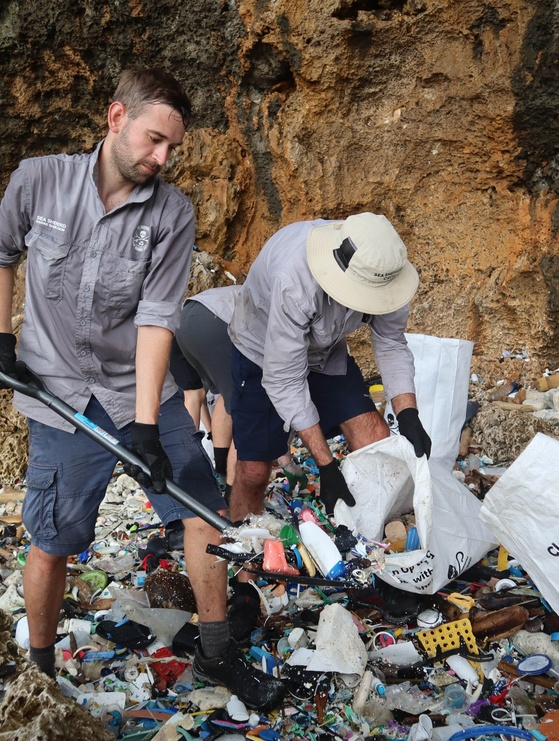Sea Shepherd's Remote Beach Clean-ups
Christmas Island 'Trash Bash'
In 2021 and 2022, Sea Shepherd crew travelled to Christmas Island in the Indian Ocean to undertake intensive remote clean-ups of the island's beaches. Watch the video from our 2022 clean-up below or keep reading to find out more about our Christmas Island Trash Bash Campaign.

Over a week-long campaign in August 2021, seven Sea Shepherd volunteers travelled to Christmas Island.
The campaign resulted in the removal of over 2,800 kgs of trash from the beach - estimated to be more than a staggering two million pieces of marine litter!
Get a first-hand account of the Christmas Island 2021 clean-up by reading field updates from Sea Shepherd Australia's National Marine Debris Campaigner, Marina Hansen.

Christmas Island is a remote Australian territory in the Indian Ocean located 2,600 kilometres northwest of Perth, Western Australia.
Sadly, some of the island's white sandy beaches have a high accumulation of plastic pollution as a result of the Indonesian Flow Through (IFT), a powerful current that carries water from the Pacific, through to the Indian Ocean.
This current also carries a tsunami of ocean plastics day after day, ranging from everyday consumer plastics such as single-use straws, food and pharmaceutical packaging, polystyrene, plastic drink bottles and lids, thongs to fishing gear. While cleaning Greta Beach - a hard-to-reach beach on the island that is a nesting site for Green turtles - our crew witnessed marine plastic on every wave.

“The continual waves of plastic washing ashore at Greta Beach was so shocking and was at a rate that I’d not seen before despite being part of over 75 Sea Shepherd beach clean-ups. As fast as we were cleaning it up, more plastic would wash in. It was a challenge both mentally and physically dealing with over 2.8 tonnes of trash on what is a place of biodiversity and beauty."
- Sea Shepherd Australia's National Marine Debris Campaigner, Marina Hansen.

Christmas Island is known as the 'Galapagos of the Indian Ocean' and is home to an abundance of unique wildlife. There are many species of seabirds, including the endangered Abbotts Boobie, and the island hosts the famous red crab migration which occurs during the months of November and December.
Even though the beaches are quite small, they are nesting sites for Green turtles. Our team's resolve to clean Christmas Island's beaches was driven by the knowledge that when a beach is clear of rubbish, turtles will come ashore to lay their eggs. They scan the landscape before making the arduous journey to above the high tide line to nest, but if obstacles are in their way, they will often turn around or not even attempt to come ashore.
Turtles are not the only species on the island impacted by plastic. While cleaning Greta Beach, volunteers witnessed a hermit crab using a plastic lid as a substitute shell. The lid was from a toothpaste tube or similar type of packaging.

Beach clean-ups are a vital tool to reduce plastic accumulation on remote beaches - and as our Christmas Island clean-up has demonstrated, hard work, passion, and determination can make a difference to defend, conserve and conserve marine life.
Our Marine Debris Campaign's Indian Ocean 'Trash Bash' campaign will be continuing in November/December 2022 at the neighbouring Cocos Keeling Islands. In 2021, our campaign in the Cocos Keeling Islands saw over 8,500 kgs of trash removed from the atoll.

“A whale or old turtle would remember the time when the ocean was clean and free of plastic but during their lifetime this has completely changed and is one more problem they must navigate.
We have come so far; ten years ago, marine plastic pollution was hardly being discussed on the global stage. But now the story is different, and scientists and innovators are developing new technologies, and I feel positive that we will find the right path. In the meantime, Sea Shepherd will continue to tackle plastic pollution on remote beaches and strive for a clean and safe ocean for all marine life.”
- Sea Shepherd Australia’s Christmas Island Campaign Leader, Liza Dicks
